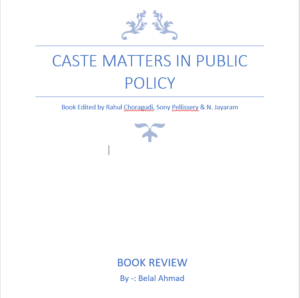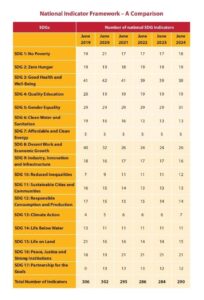DECODING SDG LOCALIZATION IN SELECTED STATES Shravani Thota, Muskan Jaiswal, Rishabh Dev Bhardwaj, Avika Kamboj, Rajlakshmi Anand Keywords: Sustainable Development Goals (SDGs); Localization; Global Indicator Framework (GIF); National Indicator Framework (NIF); NITI Aayog; MoSPI; Scheme; Policy; Delhi; Telangana; Uttar Pradesh; West Bengal. On 25th September (2015), the UNGA adopted the document titled “Transforming our World: The 2030 Agenda for Sustainable Development”, comprising 17 SDGs and 169 targets. This stands as the de-facto international obligatory cornerstone for the sustainable ‘one earth, one future’ solution, where countries are expected to reorient their domestic spending priorities. At the global level, the United Nations Statistical Commission (UNSC) established the Inter-agency and Expert Group (IAEG) to devise and monitor the Global Indicator Framework (GIF). Accordingly, in sync with GIF, the Indian Ministry of Statistics and Policy Implementation (MoSPI) has developed the National Indicator Framework (NIF), to monitor the progress of the SDGs realization at the national level. Following the row, the States/UTs are processing with their tailored sub-national monitoring operation, i.e. the State Indicator Framework (SIF) and District Indicator Framework (DIF). As per the Indian model of SDG localization promoted by NITI Aayog, the progress of States and Union Territories (UTs) as of 2024 is outlined in the tabular data (Fig. NITI Aayog, 2024). Here, the selection criterion for inclusion of Indicators in NIF includes – ‘relevance to SDG targets, ‘national priorities’, ‘data availability’, and ‘policy significance’. For each indicator, the NIF specifies data sources and periodicity. These data sources include official government statistics from various surveys, administrative data, and censuses. Responsibility for data collection and reporting rests with the concerned line Ministries and Departments. NIF is evolving in nature like the GIF. Consequently, the GOI has established a High-level Steering Committee (HLSC) on SDGs under the Chairmanship of the Chief Statistician of India (CSI) and Secretary, MoSPI to review and refine the NIF periodically. This Committee comprises members from NITI Aayog, MHA, Ministry of Health and Family Welfare, MoEFCC, Ministry of Finance, and the MoSPI. Area Parameter No. of States Completed (Out of 28) No. of UTs Completed (Out of 8) Vision/Roadmap SDG vision document 23 4 Coordination Mapping of SDG targets with schemes and departments 25 3 Mechanism for coordination with line departments at the State level 26 6 Formation of Working Groups/Committees/Task Forces 24 5 Monitoring and Reporting SDG cell/centre/team at the State level 25 1 State Indicator Framework 16 1 District Indicator Framework 6 1 Block Indicator Framework 6 1 Dashboard developed 16 1 Budgeting SDGs linked to budget allocation 11 1 Capacity Building Capacity building/training of officials 24 1 Involvement of CSOs/CSR in awareness generation and capacity building 15 2 In the recently released NITI Aayog SDG India Index 2023-24, the overall SDG score for the country stands at 71, a significant improvement from 66 in 2020-21 and 57 in 2018 (Baseline Report), here all the state’s scores have improved. Following are the selected states’ composite scores – i.) Delhi- 70; ii.) Telangana: 74; iii.) Uttar Pradesh: 67; iv.) West Bengal: 70. Delhi (A.) Profile: Officially known as the National Capital Territory (NCT) of Delhi, is India’s capital and one of its most populous urban centers. According to the 2011 Census, Delhi had a population of 16,787,941. The NCT covers an area of 1,483 square kilometers and comprises 11 districts, 3 municipal corporations, and 272 municipal wards. Additionally, it has 1,799 urbanized villages and several gram panchayats under its administrative framework (Government of NCT of Delhi, n.d.). (B.) Institutional framework for SDGs Monitoring/Coordination: The Planning Department has been designated as the nodal authority for SDGs, with its Director serving as the Nodal Officer. The Delhi Vision 2030 document has been developed to align the city’s developmental strategies with the SDGs. More than 1,500 unique and SMART indicators have been mapped to various schemes and programs, ensuring a structured approach toward sustainable development. The framework includes 15 goals and 264 indicators to monitor and track progress (Ministry of Statistics and Programme Implementation, 2022). Delhi has also established a digital infrastructure for real-time SDG tracking and monitoring. The Ministry of Statistics and Programme Implementation (MoSPI), in collaboration with the United Nations Regional Coordinator Office, has launched an SDG Dashboard to facilitate real-time data visualization and progress reporting. Various IT applications have been developed to enhance outcome-based budgeting linked to SDG objectives. The Planning Department ensures the effective integration of SDGs across government departments, aligning the region’s policies with the National Indicator Framework (Government of NCT of Delhi, n.d.). (C.) SDG-wise Existing Schemes – SDG 1: The Mukhyamantri Covid-19 Pariwar Arthik Sahayata Yojana. SDG 2: Zero HungerThe Mid-Day Meal Scheme ensures nutrition for school children, while initiatives under the Department of Women and Child Development support nutrition for children under six and pregnant/lactating mothers. SDG 3: Aam Aadmi Mohalla Clinics provide accessible primary healthcare services, improving overall health outcomes. SDG 4: The Chunauti Initiative focuses on improving learning outcomes in government schools, ensuring inclusive and equitable quality education. SDG 5: The Ladli Scheme offers financial assistance to girl children from economically weaker sections, promoting their education and empowerment. SDG 6: Projects under the Delhi Jal Board aim to provide clean drinking water and improve sanitation infrastructure. SDG 7: The Delhi Solar Policy encourages the adoption of solar energy, promoting sustainable energy solutions. SDG 8: The Rozgar Bazaar Portal connects job seekers with employers, fostering economic growth and employment generation. SDG 9: The Delhi Startup Policy supports innovation and entrepreneurship, providing a conducive startup ecosystem. SDG 11: The Mukhyamantri Awas Yojana focuses on providing affordable housing to economically weaker sections, ensuring sustainable urban development. SDG 13: The Odd-Even Traffic Scheme aims to reduce vehicular pollution, contributing to climate action efforts. SDG 16: The Delhi Commission for Women works toward preventing harassment and violence against women through dedicated law enforcement initiatives. These initiatives reflect Delhi’s commitment to localizing SDGs and achieving sustainable development across various sectors. Telangana (A.) Profile: Telangana has 33 districts and a population of










